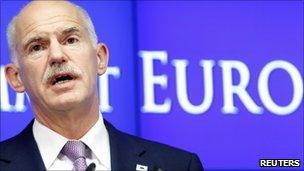Europe's big deal
- Published

Greek PM George Papandreou said the deal would lighten the load on the Greek people
After long negotiations eurozone leaders came up with a bigger plan than expected to fight Greece's debt crisis.
Marie Diron, senior economic adviser to Ernst & Young, said: "eurozone governments have agreed on a range of measures that are more extensive than the discordant statements in the days ahead of the summit suggested."
Firstly, Greece will receive financing estimated at 109bn euros ($155bn; £96.3bn). With the involvement of the private sector, that figure rises to 169bn euros.
The interest rate it pays on its current loans will be cut by 1%. The period in which it must repay the loans has been doubled.
The role of the main bail-out fund - the European Financial Stability Facility (EFSF) - will be radically expanded to act almost as a European Monetary Fund, aggressively helping banks and countries in difficulty. These are sweeping new powers.
The private sector - the banks - have agreed voluntarily to contribute initially 37bn euros. The banks will accept losses selling back their investments at a discount. It remains possible that the rating agencies will decide that Greece is in default.
There are projections that the private sector will contribute 106bn euros over the next eight years. This figure needs to be treated with some caution. It should be underlined that the involvement of the private sector is voluntary. (The figures used are baffling many observers.)
The President of the European Commission, Jose Manuel Barroso, said: "We are crystal clear that private sector involvement is for Greece, and Greece alone. It is an exceptional solution which we exclude for others. It is a unique solution."
The intention is to send a message that other banks investing in other countries will not be exposed to taking a haircut.
The EU does not want investors to stay clear of other fragile European economies.
"The key uncertainty", said Ms Diron, "is whether financial markets will accept official statements that this deal is for Greece and for Greece only. If the eurozone needed to go through a similar process for Ireland and Portugal, the economic cost would become much larger".
The Greek Prime Minister, George Papandreou, said the Greek debt load would be reduced by 26bn euros by 2014. With the Greek debt still rising that may not be as significant a figure as it sounds.
He went on to say: "The Greek people are a proud people. We are a proud people. We are a creative and industrious people. And the only thing we are asking for is the right to make major changes in our country - profound, deep changes in our country. And we are committed to implement this programme for these changes."
These are stirring words, but doubts will remain as to whether, having won a second bail-out, Greece will remain committed to unpopular austerity measures and privatisations. The programmes were already in trouble.
What may help is that Europe's leaders recognise Greece needs growth and have offered to divert money from the EU's structural funds.
German Chancellor Angela Merkel said: "I've always made it clear that today is not someone standing up and waving a magic wand, but it's about helping Greece return to the path of stability to trigger a controlled and controllable process. I'm confident today that we can succeed in this endeavour."
The agreement also agrees to lower the interest rates paid by the Republic of Ireland and Portugal, the two other eurozone states which have been bailed out.
The head of the IMF said "that is really a game-changing decision".
With this plan the eurozone's leaders have deployed their heavy weapons, but it remains unclear what real difference these measures will have in bringing down Greece's huge debt mountain.